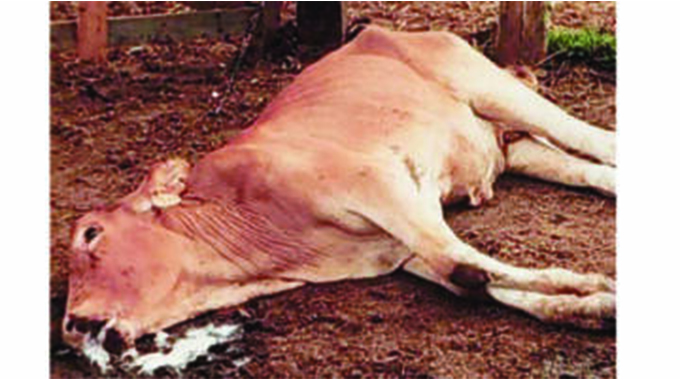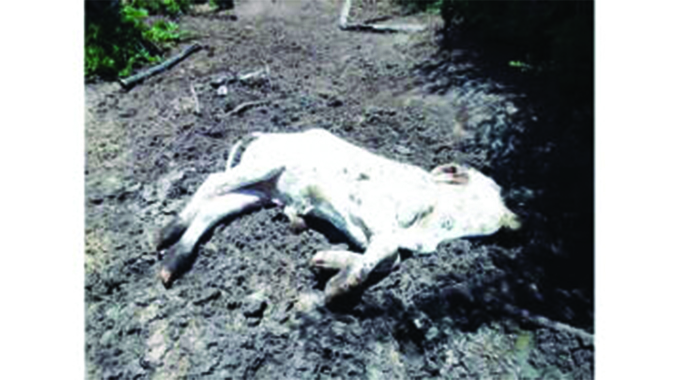
The Sunday News

THE Department of Veterinary Services on its website says the Theileriosis disease, also known as January disease, is spread when cattle are bitten by a tick, which is carrying the disease. It says Theileria is not spread by direct animal-to-animal contact and does not affect other species, or humans. It is spread through the bite by the brown ear tick and is common between December and March.

However, of late theileriosis now occurs all year round but increases significantly as from November, reaching a peak in January. Theileriosis usually occurs in high rainfall areas and also in low rainfall areas such as Chiredzi where it is transmitted from buffaloes. The department says its signs and symptoms include swelling of the lymph nodes under the ears and on the shoulder, cloudiness of the eyes, difficult breathing with froth exuding from the nose and the mouth, weakness, pale or yellow (jaundice) mucous membranes ie the gums, inside the vulva and the white around the eye, depression, not eating, weight or condition loss, abortion, poor milk production, or the animal collapses and dies.

Department of Veterinary Services
Farmers have been encouraged to contact their nearest veterinary offices in the event that they suspect that the disease has hit their area. Furthermore, anti-parasitic drugs can be effective if treatment is done early. It has become important that local farmers know about the disease, as it has killed a lot of cattle in the Matabeleland region in recent years. The region was not spared this year with over 250 deaths already recorded since December at Fort Rixon, Matabeleland South province which falls under Insiza district.
Our livestock columnist, Mhlupheki Dube, noted last week that; “Most importantly a lot of families will slide into abject poverty because their lifelong investment has been cleaned by the January disease.
Remember, dear reader that most people moved their investment into the livestock sector because of the inflationary economic environment we have had for close to two decades now. Anyone who needed to invest so that they can be able to retire in comfort or be able to send their kids to schools and tertiary institutions, put their money into livestock.

“This is the investment which is seriously threatened by this ruthless disease and like I said above, you ought to be alarmed. This is therefore a call for all stakeholders who are involved with livestock to drop everything else you have been doing and arm yourself for this very important battle. Let us support our Government veterinary extension arm to run around and contain this disease. As private sector now is the time to plough back and protect your industry or else you will soon find yourself in the streets with no clients anymore. If the department of veterinary services wants to remain relevant to the livestock farmer, now is the time to bring your top game to town and contain this menacing disease.”
You can imagine, dear reader, the emotional trauma that farmers in Fort Rixon have been through, particularly those who have lost large numbers of cattle. We reported last week that a 65-year-old Fort Rixon widow has so far lost more than 50 cattle as the dreaded theileriosis has ravaged through the area leaving peasants and small scale farmers wallowing in abject poverty.

The widow, who is Insiza District Ward 18 councillor, Jostinah Ndondo is not alone in the loss of her investment. Her neighbour, Mr Tadious Mhlanga (58) has so far lost 22 cattle to the tick-borne disease, among a list of villagers who have lost varying numbers of cattle since the disease attacked the Matabeleland South district last month. The disease is forcing farmers to sell their cattle at drastically low prices of US$100 to US$300. In good times, cattle in the area sell for between US$500 and US$800, depending on the size and breed.
While the government is doing all it can to contain the situation, there is need for private players as well to chip in to assist the small scale farmers to save their herd. This will also feed into rebuilding the national herd.



